Babies Don't Need Snacks: Why Your Early Eater is Better Off Skipping Snacks
- What a baby’s typical meal schedule can look like at 6-7 months, 8-9 months and the 10-12 month stage
- Why the breastmilk and/or formula your baby is drinking between meals is the “insurance policy” to fill in the nutrient gaps as baby is learning to eat more food
- Some instances of when snacks might be needed and my favorite go to snacks for babies
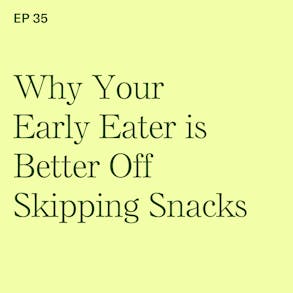
LISTEN TO THIS EPISODE
Episode Description
Think your baby needs snacks? Think again. In this episode, we’re diving into why milk—breastmilk or formula—is your baby’s perfect “snack” between meals and why skipping snacks during the weaning phase can set your baby up for better eating habits in toddlerhood. You’ll learn how early snacking sabotages appetite and meals, and how to build a solid feeding routine without the snack trap.

Links from this Episode
- Baby-Led Weaning with Katie Ferraro program with the 100 First Foods™ Daily Meal Plan, join here: https://babyledweaning.co/program
- Baby-Led Weaning for Beginners free online workshop with 100 First Foods™ list to all attendees, register here: https://babyledweaning.co/baby-led-weaning-for-beginners
Other episodes related to this topic:

Latest Episodes
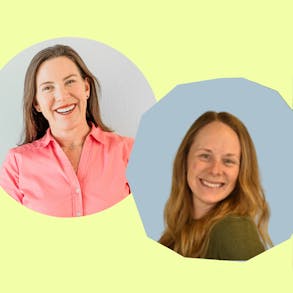
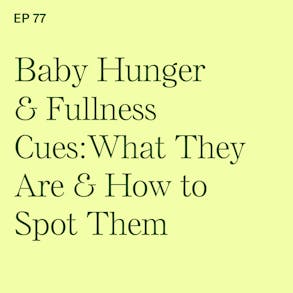
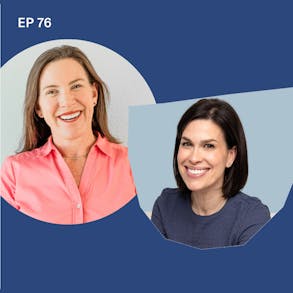
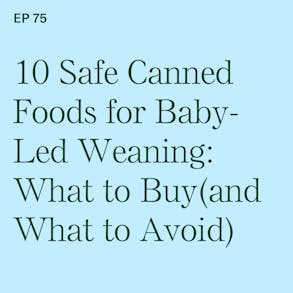
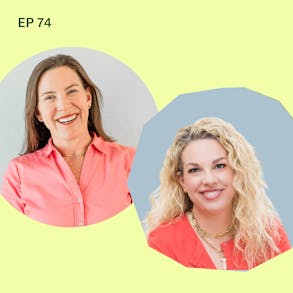
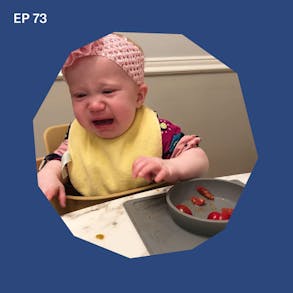
Skylight Frames (1s):
Let's be real that keeping track of anything when you have a baby is laughable. I remember forgetting my own quadruplet baby's pediatrician appointment because it had the reminder like on the sticky note that was in the diaper bag that was in the back of the van, but then I found the skylight calendar and wow, my mom brain finally has help. This Skylight calendar is a beautifully designed 15 inch digital display that syncs with all of your existing calendars. So Google, apple, outlook, you name it. It's basically like your brain, but way prettier and sorry, way more reliable. I have our skylight calendar set up in our kitchen. It shows everything like upcoming doctor's appointment visits, work calls, birthday party, RSVPs. I even color coded the events for every family member and put the what's for dinner like meal plan in there if you have toddlers who can't read yet. The Skylight also has a whole setup where you can assign emojis to different tasks on your chore chart so they know what it means and then they can check it off. And it really just starts help building independence and responsibility from an early age, because take it from me with school age kids. You want those kids to know what their schedule is and you need to know what their schedule is. Skylight Calendar makes it all possible, and with the free Skylight app, you can update on the go. So like when your friend texts you about a mom meetup, when you're one handed nursing a baby, you are not going to forget about it. The Skylight calendar will help save your sanity and your happiness is skylights happiness. So if in 120 days you are not 100% thrilled with your purchase, you can return it for a full refund and no questions asked. So right now, skylight is offering our listeners $30 off their 15 inch calendar. If you go to skylightcal.com/weaning, that's skylightcal.com/weaning for $30 off your 15 inch calendar. I'll say it one more time. skylightcal.com/weaning and get your calendar game on point now because I know if you're like me, your brain is approaching max capacity with your kids. And Skylight Calendar is pure heaven for connecting your digital and your non-digital world together.
Katie Ferraro (2m 7s):
And if you're brave enough, next time you're at the grocery store, target or Walmart, take a gander at the types of snacks that are being marketed to toddlers and increasingly to babies. You will see they have added sugar, they have added salt. They're packed with either ingredients that you can't explain or pronounce. They have fillers in them. They also tend to have refined white carbohydrate foods. You'll see a lot of potato stars. You'll see a lot of pear or apple juice or apple concentrate. You'll also see a lot of rice ingredients, which at this point, every major health body recommends against the regular use of rice ingredients in foods for babies because of the potential for arsenic toxicity, and yet their widespread in snacks that parents think their babies need.
Katie Ferraro (2m 51s):
Hey there. I'm Katie Ferraro, registered dietitian, college nutrition professor and mom of seven specializing in Baby-Led Weaning. Here on the Baby-Led Weaning with Katie Ferraro podcast. I help you strip out all of the noise and nonsense about feeding, giving you the confidence and knowledge you need to give your baby a safe start to solid foods using Baby-Led Weaning. Hello and welcome back. In today's episode, we're gonna be talking about snacks and why your baby does not need snacks. Your early eater is actually better off skipping snacks, and I'll explain why along with some sample language that you can use when you're feeling the pressure from everyone around you to feed your baby snacks.
Katie Ferraro (3m 36s):
I put out two new episodes of this podcast every week, a mini training episode on Monday I do solo, and then on Thursday I do a longer interview style episode with another feeding expert. Be sure to hit subscribe wherever you're listening to or watching this podcast so you will get notified when each of the two weekly episodes are live. And thank you so much for listening, and if you've got a mom friend or someone you know who's just starting solid foods, please do tell them about this podcast as well. We've got over 500 episodes, so lots of opportunities to learn for free. If you're just getting started with Baby-Led Weaning, one of the best places to go to see how to actually prepare food safely is my free online workshop. It's called Baby-Led Weaning for Beginners.
Katie Ferraro (4m 17s):
This is a workshop you can take right now, later today, tomorrow when your baby naps, whatever's convenient for you. I give everybody on that free online workshop a copy of my original 100 First Foods list. You can print it out, put it on your fridge so you'll never worry about which food to feed your baby. Next, you can sign up for that free Baby-Led Weaning for Beginners workshop at babyledweaning.co/workshop. And if you already have the 100 First Foods list and you're ready to dive in and learn about how to make all of those foods safe for your baby's age and stage, my online program, Baby-Led Weaning with Katie Ferraro is your step-by-step comprehensive plan to show you exactly how to make each food, which food to offer.
Katie Ferraro (4m 58s):
Next, I've got feeding schedules. I've got a 100 First Foods content library in there with tons of videos and recipes and instructions on how to make all the foods for your baby's age and stage. And if you just don't wanna think about it, my 100 First Foods Daily Meal Plan is also inside of that program. It's 24 weeks of meal plans for your babies to get them for the through those first hundred foods. You literally don't have to think about it, I did it for you. You can sign up for the program Baby-Led Weaning with Katie Ferraro at babyledweaning.co/program. I like to start out each of these mini training episodes with a Baby-Led Weaning tip of the day. And this tip, I kind of gave it away in the title, but babies do not need snacks, plain and simple.
Katie Ferraro (5m 38s):
Okay? Anyone who tells you that babies need snacks, like when you see menus and meal plans are like three meals and three snacks. First of all, who has time to prepare food six different times a day? But they're also usually just trying to sell you snacks or sell you on the idea that babies won't eat the meals that you prepare. And that is certainly not true. So hang tight because In this episode I'm gonna show you exactly how you can schedule your meals with milk being the snack in between meals that tide your baby over from meal to meal, even when you're just starting, so that you can remain snack free for as long as you would like to because you are the boss of your own house and you are in charge of what your baby eats, right? We talk about Ellen Satter's, division of responsibility in Feeding Theory.
Katie Ferraro (6m 20s):
Ellen Satter is a dietitian and a family therapist, and what her theory says is that we have three jobs as parents, right? We're responsible for what the baby eats when they eat and where they eat, but your baby is ultimately responsible for how much or even whether they eat. So we've got some jobs to do, right? We gotta make sure the baby is eating in a safe environment. We gotta make sure they're eating at set meal times. We do not let children graze or snack all day, and we're also in charge of what the baby eats, and that's what we're gonna focus on today. Because What a baby eats does not need to entail snacks if you don't want it to. So let's dive in. First off, why do we think that babies need snacks? There's a couple of different reasons, right? They're usually external pressures, cultural pressure, okay? Snack foods that are marketed to babies everywhere.
Katie Ferraro (7m 1s):
Just if you're brave enough, take a gander down the baby food aisle at your nearest grocery store or Walmart or Target. There's tons of package and processed baby food snacks, oftentimes with added sugar and salt, most of which have been put into those packages before your baby was even born shelf stable, lining the shelves, and you're like, oh my gosh, baby, my baby is supposed to eat these foods. No, not necessarily. Just like the entirety of the baby food industry. This is marketing at work making us think, letting marketers essentially dictate the way we feed our families. So parenting anxiety also plays a role. Maybe my baby didn't eat that much at lunch, or maybe they need a snack, or I'm worried that they're not gonna get enough, so I'm gonna shove this pouch down their mouth to make sure they quote unquote get enough.
Katie Ferraro (7m 43s):
Remember, it is not your job to make your baby eat. Your job is to be in charge of what the baby eats, where they eat and when they eat. But again, as Ellen Satter says, it's ultimately your baby's responsibility to determine how much or even whether they eat. What about social modeling from other toddlers and children? Oh, I see other kids eating snacks or moms buying these puffs or these stars or or whatever other shape they're extruding, refined white carbohydrates into these days for baby snacks. Does that mean that my baby needs snacks too? No, definitely not. Here's the truth. Your baby is not a toddler. Your baby is still learning how to eat. Your baby does not need snacks. And here's the kicker. If you walk away with nothing else from this episode, please remember that even as your baby is learning how to eat breastmilk or formula remains your baby's primary source of nutrition for a significant portion of the weaning period.
Katie Ferraro (8m 33s):
Okay? Your baby is still relying on infant milk, be that breastmilk or formula for their nutrition, and you can think of that milk that you are offering in between meals as the quote unquote snack that tides your baby over between meals. When you just start out with solid foods at six and seven months of age, I recommend that you do those solid foods one to two times a day. When your baby's eight to nine months of age, you can bump that up to two to three solid meals per day. And by the time your baby is 10 months of age, we like to see your baby eating three solid food meals a day, if that somewhat mimics the pattern that the rest of the family follows as far as meals go. Okay? And ideally, by the age of 12 months, most of your baby's nutrition can be coming from food. I know that your baby knows how to drink.
Katie Ferraro (9m 14s):
They're very proficient at it. They've done it for the first six months of their life to keep themselves alive. As you start introducing solid foods, infant milk continues to be important, but will gradually move the milk behind the meals. So I have an entire episode called When to Move Milk Behind Food. That's episode 235. If you wanna hear from a mom of an eight month old baby who's made that transition to moving the milk behind meals, I share all about that in that episode. You can go to blwpodcast.com/235 to learn more about that approach. But ideally, we're moving your baby to position where we're starting to prioritize food gradually, and milk will come after the meals. You are not depriving your baby if you decide to skip snacks.
Katie Ferraro (9m 56s):
They're covered nutritionally by the infant milk that they're continuing to drink in addition to the foods that they're learning how to eat at the meal times that you set. Hey, we're gonna take a quick break, but I'll be right back.
KiwiCo (10m 13s):
One of my favorite neighbors is a relatively new grandma. Her daughter just had her second baby, So I just got off the phone with this friend and we were talking about screen time for toddlers. So as the grandma, she's looking for ideas to keep her older grandkid. So he is three years old and she wants them off of a tablet or tv. So I was telling her about KiwiCo crates. So KiwiCo develops hands-on projects and activities for kids of all ages that get delivered to your door on a regular basis. KiwiCo has five clubs to choose from with unique topics like science, technology, engineering, art, and math. They're seriously fun gifts that are built to last for her grandson. And if you have toddlers, there's a KiwiCo Sprout Club that's for kids aged three to six. It's got many projects that deal with early learning and pretend play. We just did the veterinarian starter kit with one of my six year olds. He's really into animals right now, and it was so fun to help him build the x-ray light box in the project. As a parent, I know it can be hard to find a creative gift that's gonna keep your child engaged and challenged and off of those screens. KiwiCo does the legwork for you so that you can spend quality time tackling projects together. There's no commitment, so you can pause or cancel anytime. If you're ready to tinker, create and innovate. Let's get you started with some awesome gifts from KiwiCo. You can get up to 50% off your first crate at KiwiCo dot com with the promo code weaning. That's up to 50% off your first crate at KiwiCo c.com promo code weaning.
Katie Ferraro (11m 51s):
Now, what are some of the downsides of early snacking? So grazing throughout the day, we know disrupts hunger cues. Part of this whole learning how to eat process is helping your baby to recognize and learn how to respond to hunger cues using solid foods. Okay? Babies don't arrive at meals hungry enough to try new foods if they're constantly stuffed with snacks. Now, I'm not advocating for starving your baby out, especially early on in phase one of Baby-Led Weaning, which I refer to as the first eight weeks of starting solid foods in our program. That's when we do single isolated finger foods. In phase one, your baby does not yet have the skillset to use those finger foods to make those feelings of hunger go away. But as you move into phase two and phase three, the second and the third eight weeks of starting solid foods, that's the period when your baby will start to be able to recognize their hunger cues and utilize food to make those feelings of hunger go away.
Katie Ferraro (12m 41s):
But guess what? If they're constantly being applied with snacks, they will never have what I call the privilege of experiencing casual hunger. It is okay, and it's actually desirable for your child to feel some casual hunger. And yet, we live in an environment where too often parents are obsessed with making sure that their child never feels any hunger, and as such, they're constantly plying them with snacks. Snack foods tend to be processed. They tend to be soft carbohydrates. They tend to be highly meltable and very low nutrient dense filler foods. Okay? Just turn the labels over on some of these snack foods that are being marketed to toddlers and even increasingly to babies. You'll see that they contain a lot of ingredients that you can't pronounce. There's fillers in there. There's a lot of potato starch, there's a lot of white rice products in there.
Katie Ferraro (13m 24s):
We know that most of the major health bodies recommend against the regular use of rice foods in infant feeding because of the risk for arsenic toxicity. And yet, rice ingredients are still prolific in baby food snacks. Baby food snacks tend to have added sugar and salt, which we know is not appropriate for babies. So you can feel good about bypassing that entire aisle of the grocery store. Additionally, starting snacks too early has a tendency to replace more nutrient dense meals. Makes sense, right? If your baby's full of goldfish crackers, 'cause they gave them a ton of them at daycare at four o'clock, they're not going to eat the wholesome meal at 5:00 PM that you prepared for dinner. Starting snacks too early can delay the development of a mealtime structure, which we know is very important for many aspects of health.
Katie Ferraro (14m 3s):
Okay? Beyond just nutrition, the importance of eating family meals together, one of the primary tenets of Baby-Led Weaning is that it fosters family mealtime. Your baby can join the family at mealtime, but they're not gonna wanna participate if they're full of snacks. So ultimately, with Baby-Led Weaning, this is a period of time where you're trying to help your baby learn how to eat real food, not to constantly be eating snack foods. How can we set our babies up for success when they're toddlers? Okay. Ultimately, our goal here is to develop children who have a foundational love of real food. We need to take advantage of the flavor window, which is at all important period of time when your baby will like and accept a wide variety of foods. Okay? It's very hard to train a toddler to try new foods that they've never had before. But it's incredibly easy to help babies learn to love new foods.
Katie Ferraro (14m 46s):
So we want to take advantage of that flavor window period that occurs during infancy. I maintain that the two biggest saboteurs of the toddler diet are milk and snacks. Oftentimes, parents of toddlers complain that their child is picky. Well, guess what? Picky eating is developmentally appropriate for toddlers. We know that the majority of children as they cross over that one year mark into the second year of life will experience some degree of picky eating, right? And most babies who've done conventional adult-led spoonfeeding, they only have 10 or 15 foods under their belt by the time they turn one. And if you lose those 10 or 15 foods to picky eating, that becomes a very challenging child to feed. Okay? But if your baby has a hundred foods they can eat by the time they turn one and you lose 10 or 15 of those to picky eating, big deal, who cares?
Katie Ferraro (15m 29s):
You still have 85 or 90 foods that that child can eat. So we really wanna drill down on helping our babies achieve diet diversity in infancy, which is offering them the wide variety of foods and flavors that they will like and accept during that all important flavor window. That's the whole premise behind my 100 First Foods approach to Baby-Led Weaning is getting your baby to eat all of those foods on that 100 First Foods list before they turn one. You will be golden heading into toddlerhood if your child has all of those foods under their belt. If you have not yet grabbed a copy of my 100 First Foods list, I give it away to everybody for free on my online workshop called Baby-Led Weaning for Beginners. You can sign up for that workshop and get your copy of the 100 First Foods list at babyledweaning.co/workshop.
Katie Ferraro (16m 13s):
And if you're ready to start making all the foods on the hundred First Foods list, safe for your baby's age and stage, all of the meal plans, the feeding schedules, recipes, instructions, everything you need to help your baby get to that diet diversity point, it's all inside of the program. Baby-Led Weaning with Katie Ferraro at babyledweaning.co/program. So I want you to think long game, okay? Skipping snacks now helps you have a toddler who will actually eat the meals that you are eating because too often the one year olds, they drink too much milk. Okay? If you decide to switch to cow's milk, that's great. Go for it. Have lots of resources on how to do that. Once you decide to discontinue formula, if that's the route you're going, if you wanna continue breastfeeding past one, great.
Katie Ferraro (16m 53s):
But what a lot of families do is they start with that cow's milk and they don't stop. And we've got kids drinking 24, 36 ounces of cow's milk when they're 1-year-old. Of course, they're not going to eat the meals that you're preparing because they're so freaking full of milk. Snacks are the other saboteur. If a child is snacking constantly throughout the day, there's no way they're going to experience what I call casual hunger come mealtime. So when do you start snacks? I encourage the families that I work with to stand your ground and stay snack free for as long as you possibly can. Working backwards. I have found in my experience from the families I work with, but also with my own seven children that come preschool time, they're gonna mandate snacks. My kids went to a small preschool associated with our parochial school, and they were pretty heavy handed.
Katie Ferraro (17m 37s):
Mrs. Ferraro, you need to send a snack. Your quadruplets are the only kids without snacks. Okay? My kids don't need snacks because they eat a big breakfast, and I know they're going to have lunch four hours later. They have some water in between meals if they're thirsty. But when the preschool said to send, send snacks, okay, fine, I'll send a couple of snacks. Okay? But prior to that, when they're at home with me when they're one and two and even three years old, if we are on a schedule and we are at home and I know that meals will be four or five hours apart, then heck yeah, I don't need to offer those children snacks. They can have milk in between meals if that works for your schedule, if it works within the amount of milk that you're offering. But you'll get to a point where they need snacks. It's probably gonna be around preschool time, but don't start it prematurely.
Katie Ferraro (18m 18s):
'cause all you'll be doing is conditioning your child to constantly ask you for snacks. Remember how important it is to offer real food at real mealtimes and not allow your child to graze all day? You want to give your children the privilege of experiencing what I call casual hunger. And we do that by having them eat food at mealtime, drink a little bit of water or milk in between meals if that's what works for your family, and then be ready to eat and excited to eat the next time the next meal rolls around. Now, when do we rely on snacks? I will tell you, if you are off your schedule, particularly if it's a travel day, then I am all for the snacks, right? If you are gonna go a longer period of time, I know whenever we go to my mom's house for dinner, like if my mom does not care what time of bedtime is, she does not care what time I wanna eat dinner.
Katie Ferraro (19m 4s):
If she invites me over to dinner, she's gonna make dinner whenever she wants to, and I know her, it's gonna be way late. So I'm gonna offer my kids a snack prior to heading over there. 'cause I know that we're going to eat dinner later than we normally would on our regular schedule travel days if you are traveling, heck yeah, all the snacks in the world that you need to get you through that travel day. If you're interested in what snacks you can utilize for travel when you're going somewhere, especially on a plane with a baby, for Baby-Led Weaning check out episode 407. It's called Airplane snacks, portable travel food ideas that won't stink up the plane because I'm all for the snacks when you are traveling. So I hope you learned a little bit about snacks and why babies do not need snacks. It is okay to go against the snack norm.
Katie Ferraro (19m 46s):
You are not withholding nutrition. You are helping your child establish smart eating habits from those first foundational bites. So stand your ground, stay snack free for as long as you can. I'll put all the links from today's episode on the show notes page, which you can find at blwpodcast.com/35, and a special thank you to our partners at AirWave Media. If You guys like podcasts that feature food and science and using your brain, check out some of the podcasts from AirWave or online at blwpodcast.com. Thank you so much for listening, and I'll see you next time without the snacks.
Dressed: The History of Fashion (20m 27s):
But Hello, I'm Cassidy. And I'm April. And together we are fashion historians, friends and co-hosts of Dressed The History of Fashion, a podcast about why the clothes we wear matter throughout history and around the world, From the cultural and societal to the personal and often political. With each episode, we explore the multitude of meanings, quite literally sewn Into the clothes we wear. Please join us in unraveling the hidden histories reside in your closet over the course of our newly launched eighth season. New new episodes are available on Wednesdays and Fridays on Apple Podcasts, Spotify, or wherever else you listen to your favorite shows.

The Program Baby-Led Weaning with Katie Ferraro
A step-by-step digital program for starting solid foods safely and navigating the original 100 FIRST FOODS™ meal plan with baby-led weaning.
 EXPERT-LED, PROVEN APPROACH TO EATING REAL FOOD
EXPERT-LED, PROVEN APPROACH TO EATING REAL FOOD CONCISE VIDEO TRAININGS TO MASTER BABY-LED WEANING
CONCISE VIDEO TRAININGS TO MASTER BABY-LED WEANING 100 FIRST FOODS DAILY MEAL PLAN WITH FOOD PREP VIDEOS
100 FIRST FOODS DAILY MEAL PLAN WITH FOOD PREP VIDEOS
Baby-Led Weaning for Beginners Free Workshop
Is your baby ready to start solid foods, but you’re not sure where to start? Get ready to give your baby a solid foundation to a lifetime of loving real food…even if you’re feeling overwhelmed or confused about this next stage of infant feeding.
Get baby-led weaning recipes and tips delivered to your email inbox.

